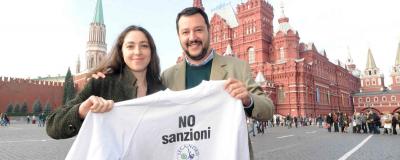Italy’s Russian expulsions lead to far-right fury

ROME – Italy has joined countries across the European Union, Canada and the United States, by expelling two Russian diplomats from its shores in solidarity with the United Kingdom, despite clear signs that centre-right leaders, Matteo Salvini and Giorgia Meloni, will seek a closer relationship with Vladimir Putin.
The action follows the case of the former Russian spy, Sergei Skripal, who was poisoned along with his daughter in the sleepy cathedral town of Salisbury by a nerve agent.
In total, 21 members of the emergency services and public were checked for contamination, with three police officers being hospitalised.
The UK government has firmly attributed the attack to the Russian government, arguing that the Kremlin was the only “plausible” force that could have carried out the attack. Russia has denied the claims, stating that Britain carried out the attack itself.
Over 100 diplomats have been expelled in total from 16 countries. The largest expulsions are from the United States, which has expelled 60 Russian officials, followed by Ukraine which has removed 13.
Donald Tusk, President of the European Council, announced on Monday that “already today, 14 members states have decided to expel Russian diplomats.” Before adding that “other expulsions are not excluded in the coming days and weeks.”
However, there are fears amongst NATO member states that the rise of the Italian right in the March 4 elections will bring about some form of appeasement for the Russian government.
Matteo Salvini, the League’s leader, tweeted in reaction to the expulsions that “Boycotting Russia, renewing sanctions and expelling diplomats does not resolve problems, it aggravates them.”
In 2017, Salvini signed a co-operation deal with Vladimir Putin’s ruling United Russia party. He was one of a number of populist parties in Europe that the Kremlin has engaged in the hope of forming alliances.
At the time of the signing, Matteo Salvini said that his party would work “so that Italy has real parliamentary elections, just as open as in your country [Russia].”
Members of the League also made up the majority of an Italian delegation that visited the Crimea, the region of Ukraine that was annexed by Putin in 2014. Senior party officials “monitored” the region’s referendum, held in the wake of the annexation, that supposedly confirmed Russia’s right to Crimea.
However, the most rabid of Russophiles in the centre-right coalition is most likely Giorgia Meloni, leader of the Brothers of Italy, who reacted to the expulsions with outrage. In particular, Meloni argued that it was unacceptable for the outgoing Prime Minister, Paolo Gentiloni to rubberstamp such a move.
“It is unacceptable that a resigning government decides to expel two functionaries of the Russian embassy,” Meloni wrote on her Facebook page. “They are the last stirrings of a government subservient to the will of foreign states, which fortunately will no longer be able to harm Italian national interests.”
tw


